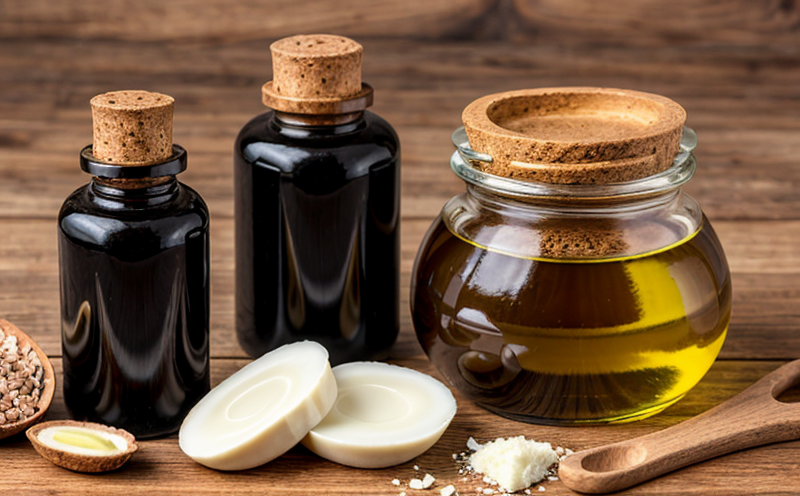EN 16642 Sterol Composition Analysis in Oils
The European Standard EN 16642 provides a standardized method for determining the sterol composition of oils. This service is crucial for ensuring product quality, compliance with international regulations, and supporting research and development efforts.
Sterols are a class of lipids that play essential roles in various biological processes such as cell membrane integrity, hormone synthesis, and regulation. The sterol profile of an oil can significantly influence its nutritional value, stability, and potential health effects. For instance, specific sterols like sitosterol or campesterol have been linked to cholesterol management when consumed.
The EN 16642 method utilizes gas chromatography (GC) coupled with mass spectrometry (GC-MS), which allows for precise quantification of various sterols present in the sample. The procedure involves several steps, including extraction of sterols from the oil matrix using an appropriate solvent followed by derivatization to enhance detection.
Quality managers and compliance officers will find this service particularly useful as it helps ensure that products meet strict regulatory requirements set forth by organizations like the European Commission or World Health Organization (WHO). In R&D settings, understanding sterol compositions can provide insights into optimizing formulations for better performance. For procurement teams, knowing the sterol content ensures they are sourcing high-quality raw materials.
Accurate sterol composition analysis is especially important in sectors where dietary fats play key roles such as food manufacturing, pharmaceuticals, and cosmetics industries. In these fields, consumers expect not only tasty products but also those that contribute positively to their health. By offering transparent ingredient lists backed by reliable analytical data, companies can build trust with customers.
It's worth noting that the sterol profile of an oil varies depending on its source (e.g., plant-based vs animal-derived). For example, vegetable oils typically contain higher amounts of phytosterols compared to animal fats. Understanding these differences is vital for manufacturers aiming to tailor their offerings to specific market needs or dietary preferences.
Compliance with standards like EN 16642 not only ensures product safety but also protects brand reputation and fosters customer confidence. As consumer awareness regarding health impacts of food consumption continues to grow, having robust analytical capabilities becomes increasingly important.
Why It Matters
The sterol composition in oils has implications beyond just meeting regulatory standards; it affects product functionality, nutritional value, and even potential health benefits. For instance, certain sterols have been shown to contribute positively towards reducing LDL cholesterol levels when consumed regularly.
- Health Implications: Specific sterols like sitosterol are known for their ability to interfere with the body's absorption of dietary cholesterol, thus potentially lowering blood cholesterol levels. This makes accurate analysis critical for ensuring compliance with recommended intake guidelines.
- Nutritional Value: The presence and ratio of various sterols can impact the overall nutritional profile of an oil product. For example, a higher concentration of phytosterols could indicate a healthier option suitable for individuals watching their cholesterol levels.
- Product Consistency: Reliable sterol composition analysis ensures consistent quality across batches, which is particularly important in large-scale production environments where slight variations might be noticeable even at microscopic levels.
In summary, mastering the sterol composition through rigorous testing aligns with broader industry trends towards more precise and personalized nutrition solutions. It allows manufacturers to offer products tailored not only to taste preferences but also to nutritional needs and health considerations.
Eurolab Advantages
At Eurolab, we pride ourselves on delivering exceptional sterol composition analysis services in accordance with EN 16642. Our team of experts ensures that every test is conducted using state-of-the-art equipment and methodologies to guarantee accuracy and reliability.
- Accurate Results: Leveraging advanced GC-MS technology, our laboratory provides precise measurements even for trace amounts of sterols in complex oil matrices.
- Comprehensive Reporting: We offer detailed reports outlining the complete sterol profile along with quantitative data on individual components. This information is invaluable for R&D teams looking to optimize formulations or comply with regulatory requirements.
- Fast Turnaround Time: Our efficient processes mean that turnaround times are kept as short as possible without compromising on quality, allowing clients to receive results promptly and make informed decisions swiftly.
- Compliance Assurance: By adhering strictly to the latest versions of relevant standards like EN 16642, we ensure that our tests meet all necessary regulatory expectations. This includes not only current regulations but also anticipating future changes to maintain a competitive edge.
In addition to technical expertise, Eurolab offers personalized consultation services aimed at helping clients understand how sterol composition analysis fits into their broader quality assurance strategies. Our goal is always to provide solutions that meet the unique needs of each client while enhancing overall product quality and safety.
Use Cases and Application Examples
- Dietary Supplements: Ensuring sterol content meets specified limits helps in formulating effective supplements aimed at supporting cardiovascular health.
- Pharmaceuticals: Pharmaceutical companies can use this analysis to ensure that their products do not contain harmful amounts of certain sterols while optimizing the inclusion of beneficial ones.
- Cosmetics: The sterol profile in cosmetic oils influences texture and stability, making it crucial for developing high-quality skincare and haircare products.
- Packaging: Understanding sterol composition can help packaging designers choose materials that best preserve the integrity of the contained product over time.
- Animal Feed: For producers of animal feed, knowing the sterol content ensures optimal nutrition for livestock, which in turn affects meat and dairy quality.
- Dairy Products: Sterols play a role in stabilizing fats during processing. Accurate analysis is essential to maintain product quality throughout shelf life.
In all these applications, accurate sterol composition analysis provides critical insights that can lead to improved product performance and enhanced consumer satisfaction.





